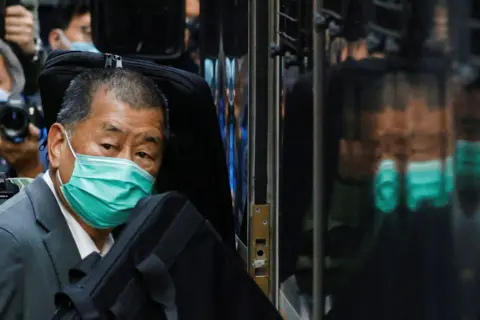Lawmakers ask HK court to call them as witnesses in Jimmy Lai case
 Reuters
ReutersA group of current and former politicians from nine countries have demanded to be called as witnesses in the trial of Hong Kong’s imprisoned media mogul and democracy activist, Jimmy Lai.
The group, including former UK Conservative party leader Iain Duncan Smith and Japan’s former defence minister Gen Nakatani, say that they have been cited dozens of times in evidence presented during Mr Lai’s national security case.
Despite this, they have not formally been contacted about the trial - which the letter says "undermines the integrity of the investigation".
Mr Lai has been accused of colluding with foreign forces under the Beijing imposed national security law.
If found guilty, the 76-year-old founder of the now defunct pro-democracy newspaper Apple Daily, is facing possible life in prison.
His case, which began last December after a year-long delay, has sparked an international outcry and is widely seen as a test of Hong Kong's judicial independence.
In a joint letter - seen exclusively by the BBC - the Inter-Parliamentary Alliance (IPAC) on China say its members have been cited more than 50 times in Jimmy Lai’s national security trial, and have requested to submit evidence to the court.
“The fact that IPAC as 'witnesses' or 'accomplices' to an alleged crime have never been approached by the Hong Kong authorities is revelatory of the degree to which the integrity of this trial is in question," said Luke De Pulford, the executive director of the IPAC.
"This case was never about the truth," Sir Iain added. "But we now have an opportunity to see how far English common law used in Hong Kong, respected by the world over, has been traduced by the national security law of China."
Hong Kong insists it is still underpinned by the rule of law, upheld by a common law legal system inherited from the British.
Beijing has also previously dismissed IPAC as being "anti-China". Its members include individuals known to be highly critical of China's Communist rulers, including US Senator Marco Rubio.
Founded in 2020, IPAC is formed of lawmakers from 34 legislatures and parliamentary bodies who are pushing for a coordinated policy from democratic countries towards China on issues such as trade, security and human rights.
The alliance has vigorously opposed the implementation of Hong Kong’s National Security law, declaring that it made “Hong Kong one of the most dangerous places in the world to disagree with the government”.
The BBC has contacted the Hong Kong Department of Justice for comment.
